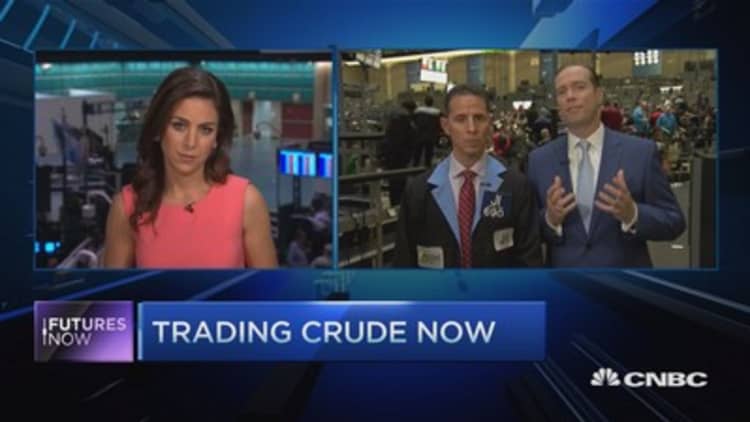
Crude prices swung back and forth in choppy trade on Friday as traders closed positions at the end of a week that saw prices briefly rising by the most in over six years earlier in the session.
Market participants flipflopped between the negative fundamentals of persistent oversupply and support factors from Syria-related concerns and a weaker U.S. dollar.
"Prices are moving on profit-taking before the weekend. There is also a partial holiday in the U.S. on Monday," Commerzbank analyst Carsten Fritsch said, referring to the U.S. Columbus Day holiday.
Read More Crude awakening: Beware oil's 'dead cat bounce'
Earlier in the session, Brent was on track to notch its highest weekly percentage gain since 2009, but some traders said the sharp rise was overblown, prompting speculators to take profits.
Brent, the global benchmark, was down 45 cents at $52.60 a barrel, during a volatile session that saw the contract touch an intraday high of $54.05.
U.S. crude settled up 20 cents, at $49.63 a barrel — rising more than 8 percent for the week.
Baker Hughes reported Friday that U.S. energy firms cut oil rigs for a sixth week in a row, the longest streak since June, a sign low prices continued to keep drillers away from the well pad.
Drillers took a net nine rigs out of U.S. oilfields in the previous week, bringing the total to 605, according to Baker Hughes. At this time last year, producers had 1,609 rigs in operation.
Read MoreGoldman Sachs sees oil rally fading
The momentum had been more bullish earlier in the session after the U.S. central bank's meeting minutes on Thursday showed more policymakers than expected had agreed to keep the first interest rate hike in a decade on hold.
"The market is taking a pause here. After the move to almost $51, if it actually settles down in a day, it's a little bearish and might be turning to lower prices next week," said Kyle Cooper, analyst at IAF Advisors in Houston.
The U.S. House of Representatives passed a bill on Friday to overturn the 40-year-old ban on oil exports, but the measure did not get enough support to overturn any veto by President Barack Obama, and similar legislation in the Senate faces an uphill battle.
In the Middle East, an Iranian Revolutionary Guards general was killed near Aleppo, where he was advising the Syrian army.
Read MoreBoone Pickens: Russia 'new sheriff' in Mideast
Saudi Arabia kept its crude oil production steady in September, an industry source told Reuters, maintaining a high level of output as part of a strategy to defend market share.
"There will have to be a change in the OPEC market share strategy for oil balances to return to normal in a reasonable period of time. Until that happens the current projected cut in U.S. production will not be enough," said Dominick Chirichella, an analyst at the Energy Management Institute.

